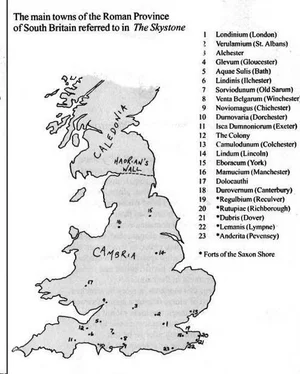Jack Whyte - The Skystone
Здесь есть возможность читать онлайн «Jack Whyte - The Skystone» весь текст электронной книги совершенно бесплатно (целиком полную версию без сокращений). В некоторых случаях можно слушать аудио, скачать через торрент в формате fb2 и присутствует краткое содержание. Жанр: Старинная литература, на английском языке. Описание произведения, (предисловие) а так же отзывы посетителей доступны на портале библиотеки ЛибКат.
- Название:The Skystone
- Автор:
- Жанр:
- Год:неизвестен
- ISBN:нет данных
- Рейтинг книги:5 / 5. Голосов: 1
-
Избранное:Добавить в избранное
- Отзывы:
-
Ваша оценка:
- 100
- 1
- 2
- 3
- 4
- 5
The Skystone: краткое содержание, описание и аннотация
Предлагаем к чтению аннотацию, описание, краткое содержание или предисловие (зависит от того, что написал сам автор книги «The Skystone»). Если вы не нашли необходимую информацию о книге — напишите в комментариях, мы постараемся отыскать её.
During the days of the decaying Roman Empire, the legions of Britain struggle to preserve the ancient principles of loyalty and discipline-virtues embodied in the Roman general Caius Britannicus and his friend Publius Varrus, an ex-soldier turned ironsmith. Whyte re-creates the turbulence and uncertainty that marked fifth-century Britain and provides a possible origin for one of the greatest artifacts of Arthurian myth-the legendary sword Excalibur. Strong characters and fastidious attention to detail make this a good choice for most libraries and a sure draw for fans of the Arthurian cycle.
The Skystone — читать онлайн бесплатно полную книгу (весь текст) целиком
Ниже представлен текст книги, разбитый по страницам. Система сохранения места последней прочитанной страницы, позволяет с удобством читать онлайн бесплатно книгу «The Skystone», без необходимости каждый раз заново искать на чём Вы остановились. Поставьте закладку, и сможете в любой момент перейти на страницу, на которой закончили чтение.
Интервал:
Закладка:
"Ladders! How did they bring up ladders?" He was still thinking that as he smashed to the ground at the bottom of the ditch, twenty-five feet below. Thirty miles to the east of Gallifax, at precisely the same time, Lollius Malpax was in agony. There was no wind in his sector, but Malpax would have been oblivious to it anyway. Malpax had the runs, and he had had them for two days. His bowels were a water-filled labyrinth of twisting cramps and his total attention was given to timing the onslaught of his next bout of diarrhoea, so that he could get permission to leave his post in time to make it to the clump of bushes that he had been using as his personal latrine behind the Wall. Malpax was a Pannonian, from Hungary, and his squad commander was an Iberian who hated Pannonians. Malpax, after two days of suffering, had reached the point where he would have changed his name, his place of birth and his personal loyalties if he could have pleased the whoreson squad commander and been assured of some sick bay time, but it was not to be.
The commander kept him longer and longer each time Malpax asked permission to relieve himself, and he knew that one of these times he was not going to reach the latrine in time. He was correct, but for the wrong reasons. The squad commander released him and he ran, picking his way through the darkness in dim moonlight towards his clump of bushes, tugging at his clothes as he went. And then there was someone looming at him from the bushes, and a massive blow to his right shoulder that spun him sideways and threw him to the ground as he lost control and felt the warm foulness flood him. Years later he remembered thinking, just before he lost consciousness, that his squad commander had run ahead to lie in wait for him, just to get even with him for being a Pannonian. Tetrino, a Sarmatian mercenary at one of the mile castles quite close to Gallifax, but to the west, remembers only regaining consciousness to see a crowd of bodies on the wrong side of the gate in the Wall, heaving and straining at the big bar that held the gate shut. He saw the bar give way suddenly, causing some of the men to fall, and then the gates were flung wide and Pictish chariots came through, the first of them crushing the bone in his leg with its iron-rimmed right wheel and hurling him back into blackness from the pain.
Apis Elpis, commander of the guard in a section far to the west of all of these, opened the door and stepped out of the mile tower to make his inspection. He found himself face to face, almost chin to chin, with a black-bearded stranger. In describing the encounter to me later, Elpis remembered thinking, "Who in Hades are you?" before his testicles were driven up into his belly by a savage kick. His brain seemed to explode and he went blind, probably squeezing his eyes shut in protest and denial of the suddenness of the agony, and he felt hands grasping at the shoulder straps of his corselet and lifting him effortlessly sideways to throw him from the parapet to the stony ground far below.
These were the lucky ones, the survivors, the only survivors of that night I have ever met. All of them recollect that it was the middle of the last watch before dawn. None of them had any warning or expectation of attack. None of them knew what was happening, or had time to organize himself, let alone others. All of them lost consciousness and so lay as though dead. And all of them were able to escape afterwards because the enemy made no attempt to stay and destroy the Wall, or even to hold it. They overwhelmed it simultaneously in an eighty-mile-long wave, butchered the defenders and swept on south into Britain. They were well organized, silent, efficient and totally devastating. Hadrian's Wall, the vaunted bastion of Rome's presence in Britain, was chewed up within the space of an hour. The unthinkable had happened. Rome's most peaceful and prosperous colony had fallen to invasion.
Britannicus and I, as luck would have it, were among the very first to find out about it. We were about ten miles south of the Wall just after dawn, headed north on a short leave of absence to pay a visit to one of Britannicus's friends, Antoninus, who was stationed at one of the mile castles, and we crested a hill to be greeted by a spectacle the like of which neither of us had ever seen. The valley below us was choked with Celtic warriors, streaming south. We sat up there for about an hour and watched. There were thousands of them, and after the first shock of what we were seeing had passed, we realized that this was not just a big raiding party. It was an army.
We had no idea who they were, other than that they were Celts, but we knew they could only have come down from the north, and that meant they'd come over the Wall. The fact that there were so many of them, and no sign of any opposition, meant that our garrisons on the Wall must have fared very badly. Even then, staring at them in their thousands, it did not occur to us that this could be anything more than a localized breakthrough. I looked at Britannicus to see what he thought of it all, and his face was like thunder.
We had left our cohort safely quartered about five miles away, and it was a good thing we did, too. Otherwise, we would have been surprised in our camp like sitting ducks, or caught on the march in extended order, not knowing anything had gone wrong. They say more than a hundred thousand came over the Wall that day. We hadn't even known there were that many people up there! Anyway, there were too many of them for us to deal with. Luckily, they were headed south through the valley down on our right, to the east of us. Our thousand-man cohort was dug in to the south-west of where we were sitting, so we got out of there and headed back to camp.
We tried very hard to be inconspicuous, but we were spotted by a group of charioteers — two horses to each chariot, and one with four — coming down to the west of us around the other side of our hill, and we were suddenly racing for our lives. Naturally, they were down in the valley where the terrain was fairly level for their chariots. We would be safe, we realized, as long as we kept high up on the hillsides.
We were shouting to each other as we ran: the fact of chariots on this side of the Wall meant that they had captured at least one mile castle and opened up the gates to wheeled traffic. That was not a pleasant prospect for the people living to the south, and the numbers we had already seen made it obvious that we would be unable to do much to help them. I was trying hard not to notice the boulders and loose stones under my horse's hooves on the hillside; trying not to think what would happen if the horse fell; trusting that animal more than I'd ever trusted anyone or anything since my grandfather. We could hear them yelling below us, catching up and drawing level with us. As far as I could tell, there were three or four of them jammed into the four-horse chariot and two in each of the others.
We must have covered about two miles before I realized that we were on the wrong side of the valley. In order to get to our camp, we were going to have to go down, cross the valley floor and climb up the other side. Somehow, the sight of those hostiles on the wrong side of the Wall did nothing for my confidence in our Roman invincibility.
Britannicus must have realized the same thing at the same time. The hillside was starting to curve round to the east, away from our camp, and the valley bottom beneath us was narrowing dramatically, forcing the chariots into single file. They were now drawing slightly ahead of us, looking for some means of cutting us off.
"Come on, Varrus," he yelled, and he yanked his horse hard downhill to the right. My own horse stumbled as I followed him and nearly sent me flying, but he regained his stride and down we went, diagonally back the way we'd come and to the rear of the chariots. Rather than look where the horse was taking me, I preferred to watch the reaction of the chariots. Our move caught them completely by surprise, and I could hear their curses as they tried to turn at full gallop without realizing how confined they were by the encroaching hillsides. One of the small ones spilled, throwing its riders flying. I heard the unmistakable scream of a horse. The other two finally slowed right down and manoeuvred tight turns, whipping their horses hard and fast as they pulled around. We had surprised them and gained a lead, but we were headed down diagonally on a converging course with them, losing ground all the way, so that we were no more than thirty paces ahead of them when we reached the narrow valley bottom and swung left, hard, hammering up the other hillside and passing them again going in the other direction.
Читать дальшеИнтервал:
Закладка:
Похожие книги на «The Skystone»
Представляем Вашему вниманию похожие книги на «The Skystone» списком для выбора. Мы отобрали схожую по названию и смыслу литературу в надежде предоставить читателям больше вариантов отыскать новые, интересные, ещё непрочитанные произведения.
Обсуждение, отзывы о книге «The Skystone» и просто собственные мнения читателей. Оставьте ваши комментарии, напишите, что Вы думаете о произведении, его смысле или главных героях. Укажите что конкретно понравилось, а что нет, и почему Вы так считаете.









